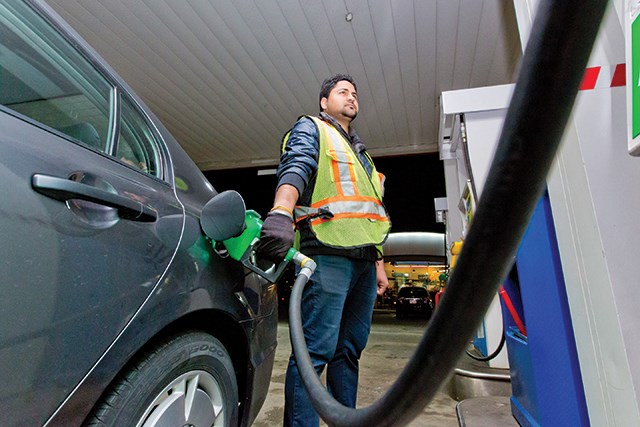Is a 48-year-old bylaw causing gas stations to go the way of the dodo bird here in Richmond?
The city has 19 gas stations, ranking ninth among Metro Vancouver municipalities, despite having the fourth largest population.
Richmond, as well as Coquitlam, is unique to the region for having a bylaw that makes full-serve stations mandatory, with no option for self-serve.
In 2003, the issue of self-serve gas pumps came before city council after gas station owners lobbied to introduce a mix of full- and self-service. City staff supported the amendment but council denied changing the law, which was initially created in 1966 out of concerns for safety. Later on, in the late 1980s, it was believed the stations promoted youth employment. Such sentiments were echoed in 2003.
Eleven years ago, the city had 24 gas stations and since then five fewer stations are now serving close to 30,000 more residents and about 12,000 additional vehicles.
The writing was on the wall, according to real estate consultant Tim Ankenman, who helped spearhead the 2003 Equitas lobby group.
“We forecasted that when we were telling council what the industry problem was,” said Ankenman.
Among the problems is/was that at full-serve stations, customers are less likely to get out of their vehicles to purchase convenience items. Combine this with the need to add additional employees to pump gas, and it means stations become less competitive.
Independent gas stations are few and far between in the city; other than Domo and Super Save Gas, large multinational corporations operate all of Richmond’s gas stations.
Ankenman noted gas companies are slowly pulling out of the city when faced with the prospects of having to renovate.
“It’s one thing to continue running old gas stations, but it’s entirely another to invest in a new full-serve gas station when there’s not a return on investment. So when it comes to renewal, companies are saying ‘forget it, let’s just close,’” said Ankenman.
Gas stations continue to maintain self-serve prices in Richmond, further hurting their profit margins, added Ankenman.
“Despite council’s decision, the service station companies didn’t want to punish their customers because of the bylaw. So they operate full-service at self-serve prices,” he said.
“The bottom line is…it’s far less popular for a service station to be in Richmond,” he added.
Among the 10 most populous Metro Vancouver municipalities, only Vancouver has a higher car to gas station ratio than Richmond, based on the most recent, annual ICBC passenger vehicle statistics and recorded gas stations on bcgasprices.com.
Vancouver has 5,400 vehicles per gas station while Richmond has 5,263 vehicles per station. Meanwhile, Burnaby has 3,225, Surrey, 4,600 and Delta, 2,080 vehicles per station. Maple Ridge takes the cake for convenience with 1,900 vehicles per station.
Of course, various factors can contribute to different consumer needs in different regions, such as proximity to workplaces and transit.
Ed Citton, manager of real estate development for Imperial Oil, said various factors can play into not redeveloping gas stations in Richmond, such as high water tables, land value, storage tank age, as well as the municipal process.
“There are a number of factors and it does include any bylaws within place — whether that’s full-serve or split-serve — or whether I can get a car wash, there’s a whole lot of reasons,” said Citton.
His company operates Esso stations, two of which have recently been abandoned on No. 3 Road and No. 1 Road.
So is the bylaw contributing to inconveniences?
Not according to at least three city councillors, who replied to inquiries from the Richmond News.
Coun. Linda McPhail noted there hasn’t been any complaints in her three years on council and “if it’s not broken, we may as well not go there.”
Coun. Bill McNulty and Coun. Harold Steves noted Richmond’s aging population and the continued desire for full-serve.
Both said there doesn’t appear to be a need for more stations.
Steves said more people will be taking public transit in the future and cars are more fuel-efficient than yesteryear.
McNulty noted, “at one time gas stations provided more services than they do now.”
In 2003, Vince Miele, a community champion for disabled rights, panned the bylaw amendment proposal and has not changed his tune.
“I feel exactly the same way now. Richmond and Coquitlam are the only two places that only have full-serve, so everyone gets treated the same,” said the chair of the Richmond Centre for Disability.
Miele noted Richmond residents still get full-service at self-serve prices. He also said split-serve gas stations elsewhere purport to offer full service but the reality is anything but.
“Try to get service at 10 p.m. You can’t,” said Miele.



